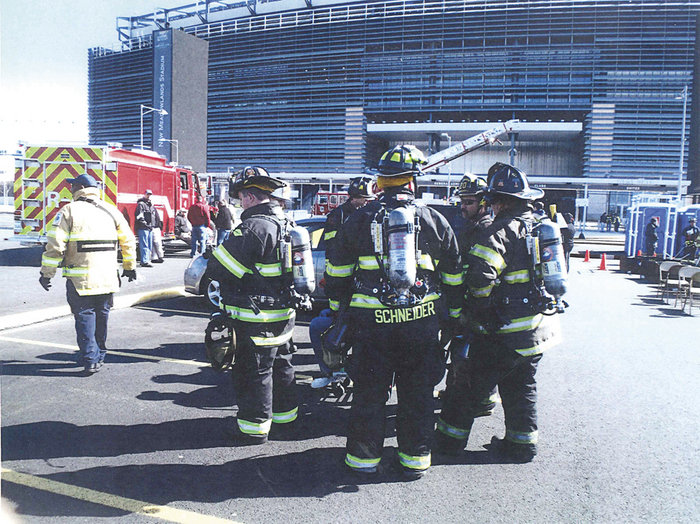With five Meadowlands area municipalities refusing to provide services to Super Bowl 2014, New Jersey Sports and Exposition Authority (NJSEA) President Wayne Hasenbalg said last week he is open to providing some form of compensation to towns like Secaucus and Carlstadt.
Super Bowl 2014 is scheduled to take place at MetLife Stadium in East Rutherford on Feb. 2.
Hasenbalg and MetLife Stadium CEO Brad Mayne met with Secaucus Mayor Michael Gonnelli and Carlstadt Mayor William Roseman in response to their announcements in recent weeks that their towns would not provide police, fire, Office of Emergency Management (OEM) and other municipal services during the Super Bowl.
The mayors took that stance after a long history of dealing with NFL teams they said “have never been good corporate neighbors to the region.”
According to a statement issued by the mayors earlier this month, MetLife Stadium, owned by the New York Jets and the New York Giants, has done little to help offset any costs for the surrounding communities when larger events occur at the stadium.
However, after meeting on Wednesday, both parties were optimistic a solution was possible.
“I do acknowledge that Super Bowl is not a normal event.” – Wayne Hasenbalg
____________
He added, “I am not closing the door on the possibility because this is a special event and there might be impacts that warrant us for providing some form of compensation.”
“It went really well,” said Gonnelli of the meeting last week. “I think something good will come out it.”
Figuring out needs
Gonnelli said that Hasenbalg and Mayne listened and gained a “much better understanding” of how the towns extend municipal services to cover events for MetLife Stadium.
Hasenbalg called the meeting “informative” and said, for example, that he learned more about the role of the Secaucus police and fire departments in matters that involve the Secaucus train station.
However, he said that it was still too “premature” to make any motion on the matter because “all the details of events…and our needs have not been settled in regard to this Super Bowl.”
He said that there “is a lot yet still in motion,” and that the actual site plan for the stadium has not been finalized.
For the 2011 Super Bowl held in the Dallas-Forth Worth area in Texas, news reports said that police worked on their days off, extra shifts, and were reassigned to security details in order to meet the needs required by the big game and the influx of people. News reports indicate that the NFL gave Dallas $3 million to pay for public safety.
Last week Hasenbalg told NJTV that “to the best of my knowledge we have not asked for any services for the football games for the Super Bowl,” and that he didn’t think the State Police, who handles emergency services during games and events, would “need that assistance at this point.”
Hasenbalg elaborated on his statement last week and said that, “we’ve been operating this complex for a long time…local law enforcement has historically provided services as the towns deem necessary during game days or concert events…no one is requiring them to do anything.”
However, he noted the Super Bowl is different.
“I do acknowledge that Super Bowl is not a normal event,” noted Hasenbalg.
Secaucus firefighters, Office of Emergency Management staff, and police officers have already participated in three trainings over the past two years involving various security response scenarios for the big game day.
A Super Bowl 2014 mock day for local municipal agencies took place on Aug. 1 last year when nearly 100,000 Jews gathered at MetLife Stadium for the religious Talmud celebration. The event halted traffic for several hours throughout the area.
According to Gonnelli, his OEM and Fire Department were activated and the Police Department was put on high alert.
“It took our residents to get home from New York five hours,” noted Gonnelli.
According to Hasenbalg, during the Super Bowl, “the traffic issues in reality will be much less than a typical game day.” He said parking at the stadium will be limited and mass transit will be the preferred mode of transportation.
“We are developing a very aggressive plan to have drop off services and have cars located off site.”
He noted that the NJSEA is waiting for the site plan to be developed, which will provide more detail on what will be required to help manage any traffic needs.
SIDEBAR
Criticism of deal struck with teams
Billboard magazine in January ranked MetLife Stadium as the No. 1 top grossing stadium in the world in 2012. According to the magazine, MetLife Stadium from Nov. 2011 to Nov. 2012 listed a total gross of $46,189,454, with a total attendance of 621,850 and a total capacity of 697,936 for 17 shows, which does not include revenue from NY Giants and NY Jets games.
According to the statement issued by the mayors, the NFL teams reportedly receive $425 million, pay $6 million for 75 acres of property, and keep all parking revenue.
Last week Gov. Christopher Christie criticized the 2005 deal reached between the state and the NFL teams during a press event in Little Ferry, as he was responding to why construction on the adjacent American Dream project has been stalled.
“Everyone involved knew it was a bad deal except for Senator [Richard] Codey,” said Christie.
Previously, Gonnelli has called the lease signed between Codey (who served as acting governor after James McGreevy’s resignation) and the New York Jets and New York Giants “a slap in the face to each and every taxpayer in the state of New Jersey.”
“How do you give away state assets and property without proper compensation?” asked Gonnelli.
According to the press statement, the state was left with $230 million in stranded debt from the old stadium that is being paid for by tax dollars.
Adriana Rambay Fernández may be reached at afernandez@hudsonreporter.com.
